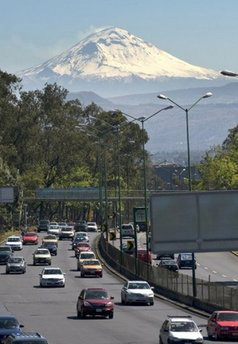
|  |  |  Editorials | Environmental Editorials | Environmental  
Clean-Up Efforts Pay Off in Mexico City
 Sofia Miselem - Agence France-Presse Sofia Miselem - Agence France-Presse
go to original
March 17, 2010


| | Unusual view of the Popocatepetl volcano in a rare clear day in Mexico City. (AFP/Omar Torres) |  |
Mexico City – Long famous as one of the world's most polluted megalopolises, gritty Mexico City is beginning to see the fruits of years of clean-up efforts and to breathe somewhat cleaner air, experts say.

"The pollution problem is still there, but it is a fact that we have been fighting pollution for more than 20 years and the improvement is undeniable," said Gustavo Alanis, with the NGO Mexican Center for Environmental Law.

Unusually good air quality in recent weeks has unveiled post card-perfect views of the snowcapped volcanos - Popocatepetl ("mountain that releases smoke" and Iztaccihuatl ("sleeping woman") - that overlook this teeming city of 20 million.

"In recent years we have beat the records for most days with passable ozone readings. In 2009 there were 185 in the acceptable range and we have started out 2010 with the greatest number of clean days, 50 out of the first 60," Martha Delgado of the Mexico City environment office told AFP.

Ozone is the most closely monitored pollutant in Mexico's capital.

In the 1990s, the air was outside the acceptable range for more than half the year because of ozone pollution, Delgado noted.

That prompted the city to put air-quality "contingency" plans into effect, limiting the number of cars that could be on city streets, suspending public works and cancelling outdoor sports activities.

Aaron Jazcilevich, a researcher at the National University's Atmospheric Science Center, said official measurements and independent studies actually agree that air quality is much better than a decade ago.

"There are two dominant factors: the weather one, with winds dispersing contaminants; and environmental regulation of private vehicles that now pollute less," said Jazcilevich.

Mexico City, under leftist governments since 1997, has launched public transport modernization programs that copied successes of Bogota with a fast-lane bus system, and European efforts to replace some car use with bicycle traffic.

Juan Carlos Zarraga, a conservative lawmaker, said air quality is better but criticized the fast-lane bus progam, which led to trees being cut down.

Jazcilevich said much remains to be done to clean up Mexico City, saying it is still far short of a goal of just one day a year outside healthy ozone limits.

But at least there is something new in the air when authorities cannot agree on whether Mexico City is still among the world's worst in terms of pollution.

"It is possible that we may no longer be in the worst five," said Jazcilevich, noting that Mexico's capital's air now trails Cairo as well as Indian and Chinese cities on the most-polluted list. |

 |
|  |



